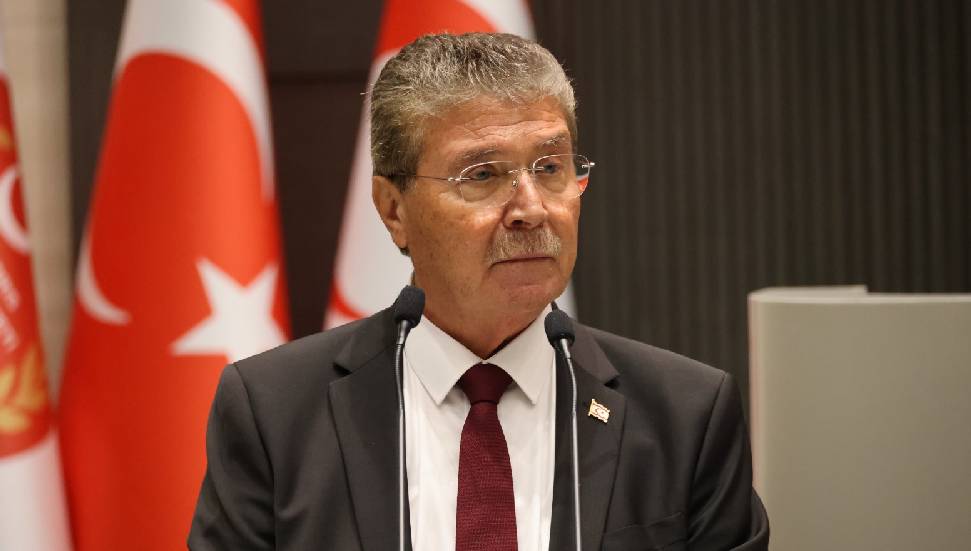Turkish Cypriot ‘prime minister’ Unal Ustel was defiant in ‘parliament’ on Monday, waving away the opposition’s demands for an early legislative election, while also being faced with hardening dissent from inside his own party, the UBP.
The next Turkish Cypriot legislative elections must take place at some point before February 2027, and Ustel insisted in his address to the legislature that he intends to wait as long as he can before returning to the electorate.
“The UBP never shies away from elections. It is always ready for an election. The election date is January 2027, but if conditions improve in 2026, we will meet with our partners and discuss the prospect. We have no reservations,” he said.
This comment garnered criticism from Erkut Sahali, the secretary-general of opposition party the CTP, who is standing in as the party’s leader after Tufan Erhurman left the party to be able to become Turkish Cypriot leader last month.
“In his statement, Ustel first stated that a general election will be held in 2027, when it should be, and then said he would determine the most logical timetable. There is a serious contradiction here. This … is a sign of confusion and not knowing what to do. We are ready to help you in this matter. This country’s greatest need is to be rid of you,” he said.
As such, he called for an election to be held on March 22, saying, “let success, failure, and more importantly, the will of the people be revealed”.
Attacks on Ustel are not only coming from the opposition, however, with dissenters inside his party now turning up the heat.

Monday’s ‘parliament’ session had to be delayed for three hours as three UBP members – Izlem Gurcag Altugra, Ali Pilli and Hasan Tacoy – did not enter the chamber and thus denied the chamber its quorum.
Altugra, Pilli and Tacoy are all former ‘ministers’ who have been relieved of their duties by Ustel, with Tacoy having unsuccessfully challenged Ustel for the UBP’s leadership at last year’s party conference.
It was Tacoy who eventually entered the chamber to allow Monday’s session to go ahead, but Altugra, who had gone on the record last week as having said she would refuse an offer from Ustel to return to his cabinet, said she will not attend Monday plenary sessions in the Turkish Cypriot legislature until Ustel resigns.
“I had already severed ties because he is unqualified and unlawful, and because he had shattered party unity … I will not attend plenary sessions, especially on Mondays,” she told newspaper Yeniduzen.
Pilli, too, was not in a charitable mood, demanding that Ustel call an extraordinary party conference – a move which would likely see him removed as party leader.
“Holding an extraordinary party conference has become essential for the party to renew itself, strengthen its public support, and move forward with more solid steps,” he said, adding, “Ustel’s duty is to pave the way for the party, initiate the process of renewal, and determine a date for an extraordinary party conference as soon as possible”.
This, he said, must be done “to ensure the manifestation of democratic will”, given that “the losses of the last three elections have demonstrated the need to reassess the party’s current approach”.
Those three elections are the Turkish Cypriot local elections of 2022, in which the party’s mayors in both Famagusta and Kyrenia were unseated by candidates from the CTP, a ‘parliamentary’ by-election in 2023, which was won by the CTP’s Sami Ozuslu, and then CTP leader Tufan Erhurman’s landslide victory over Ersin Tatar in last month’s Turkish Cypriot leadership election.
The UBP, alongside its two ruling coalition partners the YDP and the DP, had endorsed Tatar’s campaign.
Despite the growing displeasure inside the UBP, however, Ustel still appears to hold the cards.
The UBP’s internal regulations stipulate that its party leader is not required to hold a new party conference for three years after one is held, meaning that Ustel cannot be challenged for the party’s leadership by conventional means until September 2027.
However, in making life more difficult for him in the legislature, internal opponents inside the UBP could make it impossible for Ustel to govern, given the fact that his ‘parliamentary’ majority currently stands at just seven.
As such, it would only take three ‘MPs’ to vote with the opposition, or six ‘MPs’ to abstain, for Ustel to be unable to pass any legislation.
If Ustel were unable to govern, he would likely be required to fall on his sword.






Click here to change your cookie preferences